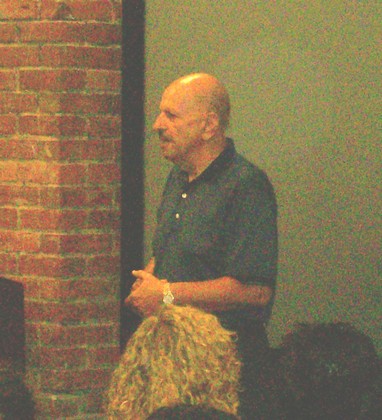
Holocaust Survivor Shares Memories
Reported by: Katie Crosbie
Thursday, Apr 23, 2009 @06:38pm CDT
Texoma
He is one of the lucky few … a survivor of one of the darkest times of human history. Paul Kessler is a Holocaust survivor who has been sharing his memories and stories with Texoma residents today. Katie Crosbie attended one of his appearances today. When Kessler was three, his father was taken from Czechoslovakia and sent to a concentration camp. Then, at age five, a peasant family let Kessler and his mother hide in their backyard. The two of them spent about a year in a four-by-four hole that was covered with twigs and manure. It was especially dangerous because at that time, Nazis were occupying the peasant family’s house. You can look at the images in books or on television … but when you meet someone who lived through the Holocaust and hear their story, it can have a whole new impact. “In today’s world, we haven’t really learned very much from the Holocaust,” Kessler said. “We've had other holocausts … we still have racism … anti-Semitism." For decades, Paul Kessler says he tried to forget the long months of hiding in a cramped hole. “I remember my mother telling me stories,” Kessler said. “I remember being hungry and cold." Just waiting ... and wondering. “I knew we were in trouble,” Kessler said, “and we were waiting for the Americans to come and help us – and save us." By the time liberators arrived ... it was too late for Kessler's father. After the war, Kessler went to Auschwitz and was handed a piece of paper documenting his father's death: June 10, 1942. “For the first time in my life, I really felt his presence there,” Kessler said. “I felt like, for the only time in my life, I was near him." Kessler says he cannot forgive the atrocities of the Holocaust ... But he doesn’t harbor hatred. “We are responsible for our actions,” Kessler said. “We have a God, but we have choices." It's a message that resonated with this crowd. ¤6 ]] C2.1 G 0 [[ *cg 2line Jessica Russell Air Force Staff Sergeant “The most dangerous thing isn't necessarily the aggressor - the person who will cause all the hatred to start - it's the people around that allow it to continue,” said Jessica Russell (Air Force Staff Sergeant). “Inaction is the most dangerous thing.” “It affects me deeply,” said Col. David Norsworthy (82nd Training Wing Vice Wing Commander). “It's hard to explain, but we just hope that we can put an end to it. Maybe even in our lifetime." Kessler says the tragedy of September 11th moved him to share his story. “As many immigrants that came here a long time ago - I think we have a special love for this country,” Kessler said. “We understand that though this country's not perfect, and we are with faults, it's the best there is." If you'd like to meet Kessler, he'll be speaking tonight at the House of Jacob Synagogue on Kemp at seven.
Article: "Holocaust Survivor Shares Memories"
Note: use http://www.archive.org/ to find article if original link no longer works
Hear this sacred survivor speak:
More on Kessler and the Texas Holohoax Circuit from plantation14:
Paul Kessler's haunting grounds include the powerful "holocaust educational museums" in Texas, with centers in Dallas, Houston and El Paso. The University of Texas at Dallas hosts numerous seminars for hundreds of high school teachers who listen to "holocaust experts" from the mother institution (the U.S. Holocaust Memorial Museum), other teachers who have taught about the holocaust, and holocaust survivors like busy Paul Kessler. He might sound silly, unbelievable and stupid, but he knows the holocaust game well.
The Dallas Holocaust Museum isn't just for Texas. It is very also concerned about issues like Iran... and the fact that a Ukrainian university granted "American neo-Nazi" David Duke an honorary doctorate. "Countering those kinds of lies is one purpose of Holocaust education centers, their leaders say. They face a particular challenge getting their information into a country like Iran, where the media are government-controlled."
The idea for a Dallas Holocaust Museum/Center for Education & Tolerance began in 1977 and came from 200 Dallas holocaust Survivors. They established the Dallas Memorial Center for Holocaust Studies in 1984 and in 2005, changed its name to the Dallas Holocaust Museum/Center for Education & Tolerance, and moved to downtown Dallas. [1]
The Holocaust Museum of Houston was opened in 1996 and is the fourth largest holocaust memorial museum in the US. "A major commitment of the Holocaust Museum Houston is the educational program." This program comprises teacher training and student programs. It also offers contests for students, such as the annual “Yom HaShoah Art and Writing Contest”. [2]
The $2 million dollar El Paso Holocaust Museum had help from the US Holocaust Memorial Museum in Washington, DC. The main goal of the Museum is “to teach young people today about what happens when bigotry and racism are allowed to flourish.” It began in 1984 by giving frequent tours for schools, tourists and for U.S. and German army trainees. It is the brainstorm of Henry Kellen, a survivor, who escaped from a camp in Lithuania and was hidden by a farmer, along with six others, under the floorboards of a house for three months before the liberation. "He, like many other survivors, kept quiet about what he had seen and endured. But, in the early 1980’s, something happened that made him rethink his silence. It was the growing and organized movement of Holocaust deniers in America and Europe that spread propaganda on the internet, in written papers and speeches. He felt he must speak out against these lies". [3]


































